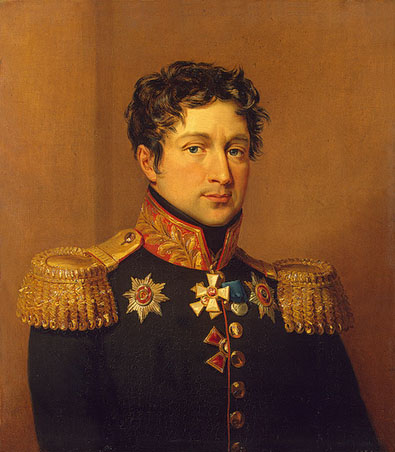The directory «Plots of stamps in the catalogue»
Olsufiev (Îëñóôüåâ) Zakhar Dmitrievich
(1772—1835)

Zakhar Dmitrievich Olsufiev was born to a noble family from Moscow gubernia. He was enlisted as an ensign in the Life Guard Izmailovsk Regiment on 15 January 1786 and participated in the Russo-Swedish War in 1789-1790. In 1795-1796, he served in the Russian squadron in Britain. He was promoted to colonel on 16 April 1797 and became a major general and chef of the Bryansk Musketeer Regiment on 5 June 1798. However, Paul suddenly disgraced him in October 1800 and Olsufiev retired to his estate. After Paul’s assassination, Olsufiev was appointed chef of Vyborg Musketeer, Regiment on 24 November 1801. He participated in the 1805 Campaign against Napoleon and fought at Austerlitz. He distinguished himself at Eylau (wounded in the leg), Deppen, and Heilsberg (wounded in the hand). For his actions, he was awarded a golden sword with diamonds and promoted to lieutenant general on 11 September 1807. He was given command of the 22nd Infantry Division in the Army of Moldavia on 11 September 1807, was wounded at Braila in 1809 and commanded a reserve corps in Wallachia in 1810. He was seriously wounded during the assault on Ruse and retired on 8 July 1810. He returned to service on 9 September 1811 and was given command of the 17th Infantry Division in General Baggovut’s 2nd Corps. During the Russian Campaign, he fought at Smolensk, Valutino and Borodino, where he defended the Utitsa Hill on the Russian left flank and received Order of St. George (3rd Class), 1 November 1812. When General Baggovut was killed at the battle of Tarutino, Olfusiev assumed the command of the 2nd Corps. In November, he participated in the battles of Maloyaroslavets, Vyazma, Dorogoubuzh, and Krasnyi. In 1813, Olsufiev fought at Lützen, Bautzen, Katzbach, Leipzig, and Mainz. During the 1814 Campaign, his corps was decimated at Brienne, La Rothiere and Champaubert, where Olsufiev was wounded and captured. Olsufiev remained in Paris until the Allied occupation of the city. He commanded the 4th Corps in late 1814 and the 17th Division in 1815-1820. He was appointed to the Senate on 22 February 1820. He retired because of poor health on 2 June 1831 and died at St. Petersburg on 20 March 1835.
USSR, 1974.02.01,  Monuments in Borodino
Monuments in Borodino